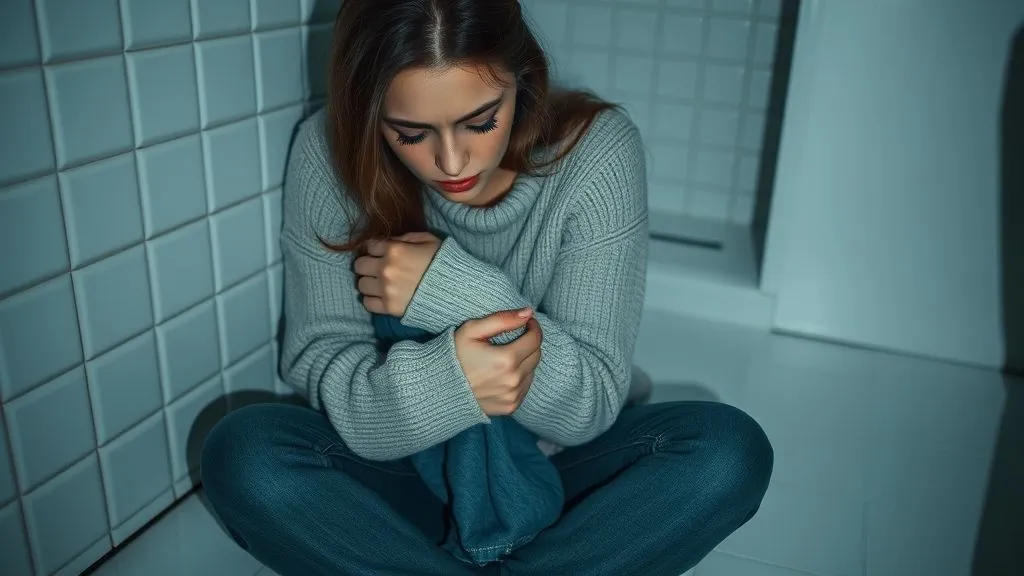
Toxic Love Meaning: What Does It Really Mean?
Toxic love doesn’t always scream. Sometimes, it whispers. In silence. In gaslighting. In that gut feeling you keep pushing down because you love them. You thought love was supposed to feel good. But lately? It feels like you’re slowly disappearing in someone else’s story. You laugh less. You second-guess more. And when you lie awake at 2 AM wondering if this is really what love is supposed to be… that’s when the truth starts to sting. Let’s talk about it. The real definition. The unfiltered, emotionally scarred, gut-punch version of what toxic love means. This isn’t just theory. This is truth written for the version of you who’s been crying quietly in the bathroom, again.

1. Toxic Love Feels Like Walking on Eggshells
Toxic love feels like walking on eggshells… in your own home. You can’t speak your truth without triggering a fight. You censor yourself daily just to “keep the peace.” You’ve learned to measure their moods before you speak — not out of love, but survival. If love feels more like strategy than softness, it’s not love. It’s control.
2. Toxic Love meaning Confuses You on Purpose
Toxic love confuses you — on purpose. One day you’re their world, almost everything. The next? You’re a burden. They deny what they said, even when you remember every word. You start doubting your memory, your feelings, even your sanity. That constant mental fog? That’s not you. That’s what emotional manipulation feels like. It’s one of the most dangerous signs of toxic love.
3. Toxic Love Thrives on Empty Apologies
Toxic love thrives on apologies that change nothing. You’ve heard “I’m sorry” so many times repeatedly every no and then, the word has lost all meaning. They apologize after the damage is done, never before. The pattern? Hurt. Apologize. Repeat. Saying sorry isn’t change. It’s just noise if the behavior never shifts. That’s how unhealthy love tricks you — it throws crumbs and calls it a feast.
4. Isolation: A Hallmark of Toxic Love
Toxic love isolates you from the people who love you most. They make subtle comments about your friends or family. You find yourself explaining or defending them constantly. Your circle gets smaller… and lonelier. Real love connects. Toxic love cuts. When they separate you from support, it’s not romance — it’s a red flag dressed in flattery.
5. Toxic Love Drains Your Energy
Toxic love demands all your energy but offers none in return. You give, and give, and give — and feel emotionally bankrupt. They expect you to be their therapist, cheerleader, and emotional punching bag. But when you’re the one falling apart? They disappear. A one-sided relationship isn’t devotion to be taken as granted. It’s depletion. You’re not their rehab center. You’re a human being who also deserves care, too.
6. Toxic Love Punishes Your Independence
Toxic love punishes your independence. When you’re happy without them, they sulk or lash out. When you chase your dreams, they call it “selfish.” When you grow, they shrink your light. Love should celebrate your wings, not clip them. If they feel threatened by your joy, that’s a toxic love symptom, not passion.
7. Using Your Past Against You: A Toxic Pattern
Toxic love uses your past against you. You shared your wounds. They turned them into weapons. In every fight, they bring up the things that hurt most. Your vulnerability becomes ammunition. That’s not a partner. That’s a mirror you can’t trust. Love should hold your pain, not throw it in your face.
8. Toxic Love meaning Romanticizes Chaos
Toxic love romanticizes chaos. Big fights. Big makeups. Repeat. You start believing pain means passion. Or you confuse intensity with intimacy. That adrenaline rush? It’s trauma, not love. Healthy love doesn’t always feel like fireworks. Sometimes, it feels like peace. And peace is not boring — it’s healing.
9. Losing Yourself in Toxic Love
Toxic love makes you abandon yourself. You’ve started lying — to them, to others, to yourself. Losing one’s self-respect in your own eyes, and you don’t recognize who you are anymore. You twist into versions they approve of, and lose your own reflection. Real love doesn’t ask you to erase yourself and become a new identity. It asks you to come home — to you. When love becomes self-betrayal, it’s no longer love like hell and you on the edge of compromise. It’s survival mode.
10. Toxic Love Meaning Makes You Question Yourself
Toxic love always leaves you wondering if you’re the problem. You’re always the one overreacting, too sensitive, too much. You end up apologizing for needing basic respect. You feel broken, exhausted, and somehow still to blame. Let this sink in: You are not the problem. You’re just stuck in something that has made you feel like you are.

The Raw Truth About Toxic Love: Meaning, Toxic love is not about screaming matches or physical violence alone. Sometimes, it’s about subtle erosion. Of self-worth. Of boundaries. Of your sense of safety. I just know what he hates.” That line still guts me. Because that’s the cost of toxic love: It doesn’t just hurt you. It replaces you. Slowly. Quietly. And by the time you notice? You’re already living someone else’s life.
Here’s What I Want You to Know
You’re not crazy.
You’re not too much.
You’re not broken.
You’re just someone who got caught in a love that looked like the movies but felt like a slow-burn cage. And yeah, walking away is terrifying. But staying? That’s soul-deep damage. So if you’re reading this and nodding through tears — I see you. I’ve been you. And I promise, there’s a version of love out there that doesn’t make you question your own worth. You deserve more. Not someday. Not when they change. Now.

Frequently Asked (But Rarely Spoken) Questions
(Because I know what you’re really trying to ask, even if you’re too tired or scared to say it out loud.)
Q1: How do I know if it’s love or just emotional damage I got used to?
If you’re constantly exhausted, always apologizing, and walking on eggshells around someone who claims to love you — that’s not love. That’s survival mode dressed up as romance. Real love doesn’t drain you. It doesn’t make you feel small. It doesn’t leave bruises on your self-worth. You already know the answer — you just want someone to say it out loud.
Q2: Why do I keep going back when I know it’s toxic?
Because deep down, some part of you still hopes they’ll change. Or maybe you think this is all you deserve. That the chaos means passion, and the absence of pain would feel like emptiness. But listen to me: you don’t have to bleed just to feel alive. That’s not love — that’s addiction. And you’re allowed to walk away even if you still love them.
Q3: Can a toxic relationship ever be fixed?
Only if both people admit what it really is — not sugarcoat it, not blame each other, but get painfully honest. And even then? It takes therapy, time, and a whole lot of unlearning. Most toxic love stories don’t get rewritten. They get left behind, because the sequel is healing — and it stars you.
Q4: What if I’m the toxic one?
Then you’ve already taken the first brave step — awareness. Most toxic people won’t even admit it. If you’re willing to unpack your wounds, own your behavior, and change without expecting applause — there’s hope. Healing doesn’t happen in shame. It happens when we stop hiding from our own mess and sit with it until it shifts.
Q5: Why does it still hurt even after I leave?
Because trauma bonds don’t break with distance. They scream at 2 a.m., they whisper in songs, they linger in your scent memory. That pain? It’s not weakness. It’s withdrawal. You’re not crazy for missing them. But don’t mistake pain for proof you should go back. Healing hurts. But staying broken hurts more.
Disclaimer: This post is for informational and emotional support purposes only. Every relationship is unique, and this is not professional legal, medical, or mental health advice. Read our full disclaimer.
Affiliate Disclosure: Some links in this post may be affiliate links. If you make a purchase through them, I may earn a small commission at no extra cost to you. Learn more here.
Pingback: How to Recognize Toxic Love in Your Relationship - Love and Breakups
mzkedo